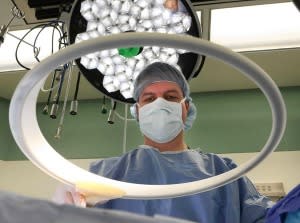Our Approach
At Stamford Health, we offer board-certified, fellowship-trained urologists in the areas of urologic oncology and robotic surgery. Our team, recently recognized by U.S. News & World Report as high performing, is experienced at treating conditions of the female and male urinary system, as well as abnormalities of the male reproductive system, in adults and children.
Our medical team has advanced training to treat a variety of urologic conditions including cancers of the bladder, kidney, prostate, and testicles. We also see patients for kidney stones, prostate enlargement (BPH), and other difficulties with urination, erectile dysfunction, vasectomies, and other surgical conditions. sexual dysfunction, and urethra strictures. For all conditions, we offer pain management resources.
Learn more about our partnership with Dana-Farber Brigham Cancer Center.
Meet Our Doctors
Advanced Technology For Precise Treatment
Urology Surgery Options Offered
Kidney Cancer Surgery
We routinely perform robotic partial and radical nephrectomies, or removal of part or all of the kidney. This approach offers a minimally invasive option for patients who require complex surgery to maximize the amount of normal kidney that is spared, leading to more precise surgery, less blood loss, a shorter time in the hospital, and a faster recovery.
Kidney Stone Treatment
Kidney stones can affect women or men at any time, often causing significant pain and interference with a person’s ability to perform their daily routines. For those who require surgical management, we offer various minimally invasive surgical treatment options for all sizes of stones.
Prostate Biopsy
For men who are considering a prostate biopsy, we routinely obtain multiparametric MRI which helps reduce the risk of an unnecessary biopsy while more accurately targeting areas of concern within the prostate using the UroNav MRI Fusion platform. Biopsies are performed under anesthesia.
Prostate Cancer Surgery
We routinely perform robotic radical prostatectomies, or removal of the prostate. This approach offers a minimally invasive option for patients who require complex surgery leading to more precise surgery, less blood loss, a shorter time in the hospital, and a faster recovery.
Surgery For Non-Cancerous Conditions
Some patients with prostate enlargement may benefit from a simple, robotic prostatectomy. For patients with ureteral obstruction, robotic ureteral surgery is available with the latest robotic technology.
Vasectomy
For men who are sure they don’t want a future pregnancy, a vasectomy is a minor medical sterilization procedure, which involves cutting and blocking the vas deferens in order to prevent sperm from traveling.
Voiding Issues From Prostate Enlargement
Men with voiding issues from prostate enlargement (BPH) may benefit from surgical treatment of their condition. We offer minimally invasive surgeries that generally are performed on an outpatient basis.
Prostate Cancer Risk Factors

Meet Our Chief, Dr. Hugh Lavery
Dr. Hugh Lavery is the chief of the division of urology at Stamford Health. He performs robotic urologic surgeries for prostate and kidney cancer as well as other surgeries for kidney stones, enlarged prostates and procedures related to the bladder and kidneys.
Dr. Lavery received his undergraduate degree from Dartmouth College, his medical degree at the University of Connecticut School of Medicine, and completed his residency in urology at The Ohio State University Wexner Medical Center.
Prior to joining Stamford Health, he was the regional director of urology at two hospitals at the Mount Sinai system in New York.
LEARN MORE ABOUT DR. LAVERY

Urology FAQs
-
What should you expect during a urologic surgery consultation, and how can you prepare for it?During a urologic surgery consultation, our specialists will conduct a comprehensive evaluation, discuss your medical history, and address any concerns or questions you may have. To prepare, bring a list of medications, past surgeries, and relevant medical records. Be ready to openly discuss your symptoms and concerns, allowing us to create a tailored treatment plan that aligns with your unique needs.
-
What are the benefits of robotic urologic surgery, and in what conditions is it commonly used?Robotic urologic surgery offers minimally invasive precision, resulting in faster recovery times and reduced discomfort. This advanced technology is commonly employed in conditions such as prostate cancer, kidney disorders, and bladder issues. The benefits include smaller incisions, less blood loss, and improved surgical outcomes.
-
How long is the recovery period for urologic surgeries, and what postoperative care can you expect?Recovery periods vary depending on the specific urologic surgery. Generally, expect to follow postoperative care instructions, including pain management, activity restrictions, and prescribed medications. Our team will guide you through the recovery process, ensuring your comfort and well-being.
-
Are urologic surgeries typically performed on an outpatient basis, or will you need to stay in the hospital overnight?Many urologic surgeries are outpatient procedures, allowing patients to return home the same day. However, some cases may require an overnight stay based on the complexity of the surgery and individual health considerations. Your urologic surgeon will discuss the expected length of your hospital stay during the consultation.
-
What is the typical recovery time for urologic surgeries, and when can you expect to resume normal activities?Recovery times vary, but our goal is to help you resume normal activities as soon as safely possible. While strenuous activities may need to be postponed initially, most patients can gradually return to their routine within a few weeks. Your urologic surgeon will provide personalized guidance based on your specific procedure and overall health.
-
How soon after urologic surgery can you engage in sexual activity, and are there any precautions to take during this period?Resuming sexual activity after urologic surgery depends on the procedure and individual healing. Your urologic surgeon will provide specific guidance, taking into account your recovery progress. It’s essential to communicate openly with your health care team, and they will guide you on any precautions or considerations to ensure a comfortable and safe return to sexual activity.




























)





